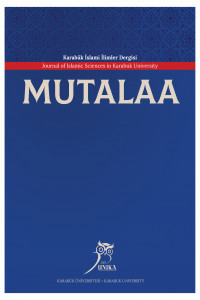Karakolda doğru söyler, mahkemede şaşar! Bereketzâde’nin Tenâkuz-ı Fıkhî Adlı Eseri Bağlamında Mahkemede Çelişkili Beyan
Konu ve Amaç: Bereketzâde İsmail Hakkı (1851-1918) yaşadığı dönemin siyasi ve sosyal olaylarını edebi ve hukuki kimliğiyle yakından takip etmiş ve bunları mümkün olduğunca eserlerine yansıtmış bir Osmanlı alimi ve hukukçusudur. Bereketzâde hukukçu kimliğinin de etkisiyle o günün şartlarında bütün adliye memurları için istifade edilebilecek bir kaynak olması düşüncesiyle Tenâkuz-ı Fıkhî adıyla tercüme-telif tarzı bir eser kaleme almıştır. O, tenakuzu lugavî, usûlî, mantıkî ve fıkhî olmak üzere dört kısımda incelemiştir. Fıkhî tenakuzu ise sarih veya zımni olarak iki sözün diğer kişi aleyhine çelişmesi olarak tanımlamıştır. Çalışmanın amacı yargılama hukukunda tenakuzun yerini ve Bereketzâde’nin bu konudaki görüşlerini değerlendirmektir. Yöntem: Çalışmada tasviri yöntemle Bereketzâde’nin eseri üzerinden tenakuz konusunun analizi yapılmıştır. Tenakuzun hangi durumlarda davaya mâni olduğu bazı örneklerden hareketle araştırılmıştır. Bulgular: Bu makalede hangi durumlarda tenakuzun mahkemece geçerli sayılacağı, her meselede tenakuzun cari olup olmadığı, hangi tür tenakuzun davanın sıhhatine mâni olacağı, dava sürecinde yapılan şahitliğin davaya muvafık olup olmaması açısından tenakuz durumları, şahitler arasındaki ve şahitlikle dava arasındaki tenakuzun davanın sıhhatine etkisi gibi konularda hukuki durumlar örnekleriyle tespit edilmiştir. Sonuç: Genel bir hukuk prensibi olarak mahkemede kişinin kendi aleyhine çelişkili beyanı davanın sıhhatine mâni değilken diğer şahsın aleyhine olan tenakuzu davanın sıhhatine mâni olur. Sadece bazı tenakuz türleri davanın sıhhatine mânidir. Dava sürecinde şahitliğin davaya muvafık olmaması tenakuzdur ve hükme mânidir.
Anahtar Kelimeler:
İslam Hukuku, Tenakuz, Bereketzâde, Mahmûd Hamza, Tenâkuz-ı Fıkhî, Dava
Contradictory Statement in Court in the Context of Bereketzade’s Tenākud-ı Fıkhī
Subject and Purpose: Bereketzāde İsmail Hakki is an Ottoman scholar and lawyer. He closely followed the political and social events of the period he lived in with his literary and legal identity and reflected them in his works as much as possible. With the influence of his jurist identity, he wrote a translation-copyright work under the name Tenākud-ı Fıkhī, with the thought of being a resource that could be used by all court officials in the conditions of that day. In this study, the place of tenākud in judicial law and Bereketzāde’s views on this subject are included. Bereketzāde examined the tenākud in four parts: lexically (lugavī), methodically (usûlī), logical and fiqh. Fiqh conflict is defined as the contradiction of two words, either explicitly or implicitly, against the other person. The aim of this study is to evaluate the place of conflict in judicial law and Bereketzâde’s views on this issue. Method: In the study, the analysis of the subject of tenākud was made through the work of Bereketzâde with the descriptive method. In which cases the tenākud prevented the lawsuit has been investigated based on some examples. Results: In this article, issues such as in which cases the tenākud will be considered valid by the court, whether the tenākud is valid in every case, which type of tenākud will prevent the proper of the lawsuit, the tenākud situations in terms of whether the testimony made during the trial is compatible with the lawsuit, the effect of the tenākud between the witnesses and between the witness and the lawsuit on the proper of the case etc. has been determined with examples. Conclusions: As a general principle of law, contradictory statements against oneself in court do not hinder the soundness of the case. However, tenākud against the other person will hinder the soundness of the case. Only some types of tenākud impede the soundness of the case. In the litigation process, the fact that the testimony is not compatible with the case is a tenākud and prevents the judgment.
Keywords:
Islamic Law, Tenākud, Bereketzāde, Mahmud Hamza, Tenākud-i Fıkhī, Courts,
___
- Ali Haydar Efendi. Dürerü’l-hukkâm şerhu Mecelleti’l-ahkâm. İstanbul: Hukuk matbaası, 1330.
- Bereketzâde İsmail Hakkı. Osmanlı Sarfının Mebâdîsi. İstanbul h. 1292 (m. 1875-76).
- Bereketzâde İsmail Hakkı. Necâib-i Kur’aniyye. Haz. Ertuğrul Özalp. II. Basım, İstanbul: Yeni Zamanlar Yayınları, 2002.
- Bereketzâde İsmail Hakkı. “Mukaddime”, Meşveret. İstanbul: Tasvir-i Efkâr Matbaası, 1318.
- Bereketzâde İsmail Hakkı. Yâd-ı Mâzî. Haz. Mümtaz Habib Güven. İstanbul: Nehir yayınları, 1997.
- Bursalı Mehmed Tahir. Osmanlı Müellifleri. Haz. Fikri Yavuz - İsmail Özen. İstanbul: Meral Yayınevi, ts.
- Coşkun, Muhammed. Bereketzâde İsmail Hakkı’nın Envâr-ı Kur’an Tefsiri ve Diğer Tefsir Yazıları. Sakarya:
- Sakarya Üniversitesi, Sosyal Bilimler Enstitüsü, Yüksek Lisans Tezi, 2008.”
- Cürcânî, Seyyid Şerif. Ta‘rîfât: Arapça-Türkçe Terimler Sözlüğü. çev. Arif Erkan. İstanbul: Bahar yayınları, 1997.
- Ebuzziya Tevfik. Yeni Osmanlılar Tarihi. Haz. Şemsettin Kutlu. İstanbul: Hürriyet Yayınları, 1973.
- Ekinci, Ekrem Buğra. “Mecelle Hakkında Değerlendirmeler”, Adalet Dergisi, 2019/1, Sayı:62, s. 347.
- Atar, Fahrettin. Fıkıh Usûlü. İstanbul: Marmara Üniversitesi İlahiyat Fakültesi Vakfı (İFAV) yayınları, 2002.
- Gürbüz, Mehmet. “Esrâr-ı Belâgat’ta Fesahata Dair”, Ankara, Ulusal Eski Türk Edebiyatı Sempozyumu, 15-16 Mayıs 2009, s. 333-348.
- Mahmud Hamza. et-Tefâvuz fi’t-Tenâkuz. Çev. Bereketzâde İsmail Hakkı. Tenâkuz-ı Fıkhî. İstanbul: Nişân Berberyan Matbaası, h. 1308 (m. 1890-91).
- Mardin, Şerif. Yeni Osmanlı Düşüncesinin Doğuşu. İstanbul: İletişim Yayınları, 1996.
- Okuyan, Mehmet. “Bereketzâde İsmail Hakkı”, Türkiye Diyanet Vakfı İslam Ansiklopedisi. Ankara: TDV Yayınları, 1992, 5/490.
- Okuyan, Mehmet. Son Dönem Osmanlı’da İki Müfessir: Bereketzâde İsmail Hakkı ve Gazi Ahmet Muhtar Paşa. Samsun: Etüt Yayınları, 2001.
- Özen, Şükrü. “Teâruz”, Türkiye Diyanet Vakfı İslam Ansiklopedisi. İstanbul: TDV Yayınları, 2011, 40/208.
- Şimşirgil, Ahmet - Ekinci, Ekrem Buğra. Ahmet Cevdet Paşa ve Mecelle. İstanbul: KTB Yayınları, 2008.
- Taşpınar, İsmail. Hacı Abdullah Petrici’nin Hıristiyanlık Eleştirisi, İstanbul: İnsan Yayınları, 2008.
- Tezel, Rüveyda. Bereketzâde İsmail Hakkı’nın Metâlib-i Âliye Adlı Eserinin Çeviri Yazısı ve Eserin Teleolojik Delil Bağlamında Tahlili. İstanbul: İstanbul Üniversitesi, Sosyal Bilimler Enstitüsü. Yüksek Lisans Tezi, 2019.
- Yiğitoğlu, Osman. Bereketzâde İsmail Hakkı ve Anılarına Göre Son Dönem Osmanlı Toplumu. Kayseri: Erciyes Üniversitesi, Sosyal Bilimler Enstitüsü. Yüksek Lisans Tezi, 2005.
- Başlangıç: 2021
- Yayıncı: Karabük Üniversitesi
Sayıdaki Diğer Makaleler
Derleyeni Bilinmeyen Bir Şiir Mecmûası: Mecmaʽ-ı Gevher-i Esrâr
İslam Hukuku (Eşya-Borçlar-Şirketler) 1. Cilt
Nebe’ Suresinin Belagat Açısından Tahlili ve Tefsire Yansıması
Ölümle Yüzleşmek & Felsefi Bir Soruşturma
Altın Mübadele İşlemeleri: İslam Hukuku Açısından Bir Değerlendirme
İslâm Adliye Teşkilâtı Ortaya Çıkışı ve İşleyişi
Kim var imiş biz burada yoğ iken? Dört Osmanlı: Yeniçeri, Tüccar, Derviş ve Hatun
